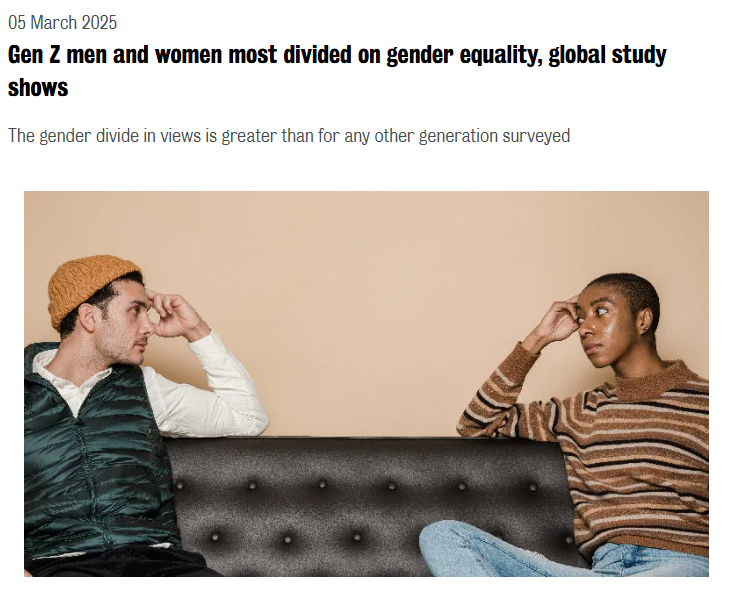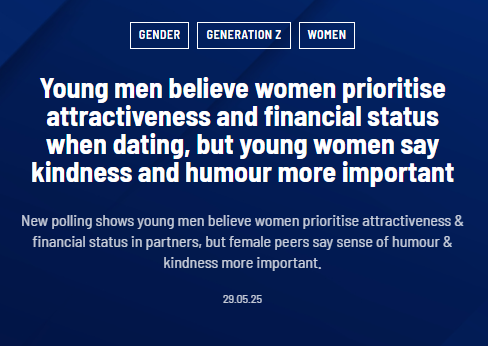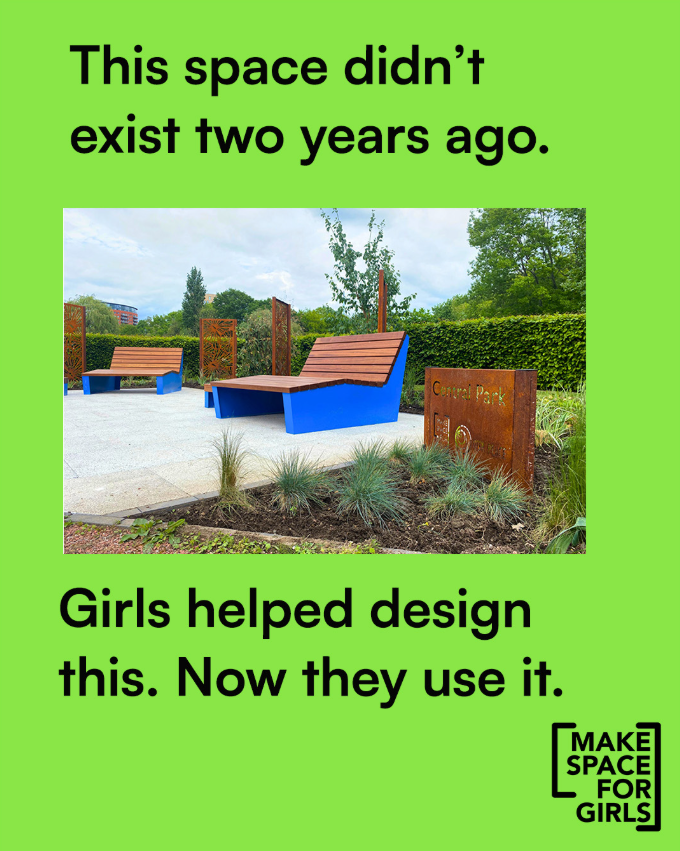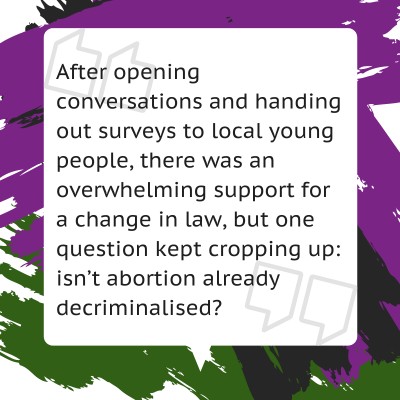Engender blog
Guest Post: Gen Z, the promise of progress, and the persistence of patriarchy
Against the backdrop of the rise in online misogyny and far-right politics, young women are increasingly concerned about a regression in their human rights. In this guest blog, MSc student Matilda Fairgrieve interrogates Gen Z’s socially active image and shares her perspective as part of a digitally divided generation.
-700.png)
Folk are fascinated by Generation Z and our many nuances.
Media outlets fiercely debate our stereotypes; from digital addicts to digital activists, the generation to which I belong is a subject of collective curiosity.
Public commentary often considers our social conscientiousness, ‘changing the workplace and culture as we know it.’ We are viewed as radical, curious and progressive; seldom are we interrogated further. But are we really this way?
Here, I explore this perception of my generation and alert attention to where assumptions of progressive attitudes demand questions – gender equality.
 57% of Gen Z men believe women’s equality has gone so far that it discriminates against men. This finding is not in isolation; with another 32% of young men believing gender equality has negatively impacted men. In this context, I position myself among the 59% of my generation who believe there is tension between men and women.
57% of Gen Z men believe women’s equality has gone so far that it discriminates against men. This finding is not in isolation; with another 32% of young men believing gender equality has negatively impacted men. In this context, I position myself among the 59% of my generation who believe there is tension between men and women.
Countless research studies and media outlets will tell you of this “tension” between Gen Z men and women. But how does this tension translate? Trepidation, as Gen Z women ponder these statistics, perplexed. How can it be that such a staggering proportion of young men we share space, workplaces and relationships with hold these views? Despite our disbelief in the percentages, there is no doubt about the problems and pain we’ve experienced as a result. A society entrenched in unequal power, from underrepresentation in politics and leadership, persistent gender pay and pension gaps, disproportionate burden of care as the norm and the violence against women and girls (VAWG) epidemic.
Intergenerationally, there is some difference in how men and women identify as feminists. However, Generation Z’s Millennial, Gen X, and Baby Boomer counterparts are not nearly as divided on the overarching importance of gender equality. Could Gen Z simply grow out of this divide? Debatable when contemplating the socio-cultural realm Gen Z grew into.
Gen Z: The distinct divide
 Unique to Gen Z’s divide is the danger lurking in the digital. It is no coincidence that a generation of men aged in a media-fuelled weaponisation of masculinity are threatened by gender equality. Research correlates the self-assessed importance of masculine identity with lower support for gender-equitable policy. Disconcerting political support compounds disconcerting narratives held by young men. Misogynistic and even incel ideologies have crept into dominance, such as 53% of young men believing women are only attracted to a “certain subset of men.”
Unique to Gen Z’s divide is the danger lurking in the digital. It is no coincidence that a generation of men aged in a media-fuelled weaponisation of masculinity are threatened by gender equality. Research correlates the self-assessed importance of masculine identity with lower support for gender-equitable policy. Disconcerting political support compounds disconcerting narratives held by young men. Misogynistic and even incel ideologies have crept into dominance, such as 53% of young men believing women are only attracted to a “certain subset of men.”
As manipulative media actors exploit tensions, isolation among young people is accelerating. 19% of young adults reported having no one they can count on socially. The most digitally connected generation exists in a remarkably distrusting, detached state.
While digitally destructive shifts did not shape the playgrounds of Gen Z’s infancy, I’d argue that a physical shift in our playgrounds set a precedent for disconnect. Gen Z’s early 2000s upbringing coincided with the introduction of Multi-Use Games Areas (MUGAs) in public parks. Open outdoor spaces, a place for equal play, became unprotected from gender roles and division, with boys making up 90% of MUGA usage.
My friends and I shared a similar sentiment to that uncovered in research: “there is nothing stopping us going through the gates of MUGAs, but we don’t feel we should.” From divided children to digital teens – the trajectory of gendered socialisation for Gen Z was fundamentally different.
Reflecting on our unique transition into the digital age with little protection, Gen Z women and I question what this means for present gender equality. With real-world implications of misogynistic digital narratives in corporate and political fields already evident, the time to ask is now.
Building bridges to connect: Real-world gender equity
 If Gen Z’s polarisation is a partial result of our upbringing, there is hope for progress in remedying social disconnection and in intervening with the voices that use it as a weapon. Without minimising the complexity we face, the courage to connect and build a bridge rather than a wall certainly feels like a place to begin.
If Gen Z’s polarisation is a partial result of our upbringing, there is hope for progress in remedying social disconnection and in intervening with the voices that use it as a weapon. Without minimising the complexity we face, the courage to connect and build a bridge rather than a wall certainly feels like a place to begin.
Of course, bridges must be built from primary prevention. While the ideological divide of Gen Z men and women may have been digitally fuelled, it was made possible by the root cause of gender inequality. The grip of misogynistic media would not be so tight in a gender-equal, real world.
It is promising to see primary and secondary prevention work picking up much-demanded acceleration in Scotland through initiatives such as the Equally Safe at School and Equally Safe at Work programmes, both shaped by a gendered understanding of the root cause of VAWG. Inspiring work to rectify early disconnects is on the rise, too, with the Make Space for Girls campaign ensuring gender mainstreaming in public spaces for play.
However, the current division between Gen Z men and women requires additional tertiary prevention, acknowledging that these attitudes are already abundant.
To my fellow Gen Z men and women, I’d like to meet outside of the digital world. In-person dialogue, focused on listening to lived experiences and restorative approaches to harm, moving from individual fear to collective security.
Do so with enough meaningful intent, and I’d like to believe our perceived progressive nature will not require interrogation. Building a bridge, together, that serves not only to connect once again, but provide an exit pathway from polarisation and a route to a gender-equitable future.
This guest blog was submitted by Matilda Fairgrieve (she/her), a Gen Z intersectional feminist and MSc student in Political Communications and Public Affairs, inspired by the drive to grow into a gender-equitable future in Scotland.
Guest posts do not necessarily reflect the views of Engender, and all language used is the author’s own. Bloggers may have received some editorial support from Engender, and may have received a fee from our commissioning pot. We aim for our blog to reflect a range of feminist viewpoints, and offer a commissioning pot to ensure that women do not have to offer their time or words for free.
Interested in writing for the Engender blog? Find out more here.
GUEST POST: Young women's political representation
-400.png)
Between now and the local elections on May 5th, we will be publishing a series of blogs from members of the Equal Representation Coalition. They’ll be taking a look at the state of equality in our politics at the moment, discussing their work in tackling barriers to participation, and will be exploring the crucial role that accurate data plays in achieving equal representation in our councils and parliaments and why we need more of it.
Here, Elena Soper, National Programmes Manager, and Rhianna Mallia, Research and Impact Manager for YWCA Scotland - The Young Women's Movement, explore the importance of ensuring our elected representatives are truly reflective of Scottish society, and their work to empower young women to make their voices heard.
YWCA Scotland is a national women’s rights organisation and part of the biggest worldwide movement of young women leading change. We work with self-identifying girls and women experiencing multiple disadvantages, but our work is not designed for crisis intervention. Our focus is on personal growth and development of life skills that build self-efficacy and tackle the root causes of underrepresentation of women in leadership. We are deeply passionate about bringing women’s voices and perspectives into the forefront, and we do this through all of our programmes, our campaigns and our research.
There is not much evidence that gender-sensitive data is gathered and published in Scotland, or used to inform decision making, policy, or to create programmes and projects that respond to the needs of women (Engender 2020. ‘Sex/gender: Gathering and using data to advance women’s equality and rights in Scotland’). We want to work to change that at YWCA Scotland, ensuring women's voices are included, amplified, listened to, and that change happens as a result.
We want young women to influence change. We do annual research, the Status of Young Women in Scotland, into an issue that affects young women and then use the evidence generated to influence decision makers and create programmes to address the gaps in support highlighted. Our approach to designing programmes and research projects depends on the participation of the groups that we are working with; strategic planning is guided by our Advisory Panel, made up of a diverse group of young women under the age of 30. Our research projects have been co-designed with young women; they gain skills and experience in designing and carrying out research, and offer essential contributions to the design of our research.
Our Young Women Lead programme which has been running since 2017 supports young women and non-binary people to become politically empowered and engaged. Originally run as a partnership with the Scottish Parliament, 3 cohorts came together to produce research and recommendations to Government on big issues such as sexual harassment in school and the transition from education to employment for ethnic minority young women. Now evolved to work within local communities, we have groups in Dundee, East Renfrewshire and Renfrewshire who are tackling issues from community perspectives.
This programme is designed to empower young people to become influencers and citizen advocates in their own community and act as role models to others. Graduates from previous programmes have been supported to take up leadership positions in the third and public sector, become community councillors and we are very excited to have one graduate standing for election in Glasgow in the upcoming Council elections.
It is so important that our elected representatives are truly reflective of Scottish society. Young women in Scotland need visible role models who look like them, have the same values as them, and come from the same background as them.
Our Status of Young Women in Scotland research in 2018 found that 64% of survey participants did not feel their voices and views are sufficiently represented in Scotland’s politics and policies and that 75% of participants who stated they considered themselves to be “politically engaged” would not run for public office.
There is a clear desire from young women to be involved in politics and activism, yet standing in an election is something that is rarely considered. The reasons given for this included fear about the current toxic political climate, worries about online abuse and structural issues within our political institutions making them not accommodating for women.
We are becoming increasingly aware of the gaps in representation in our councils and our Parliament, and we need to understand the root causes behind this to tackle it. That’s why it is crucial to gather gender disaggregated data on those who are standing for office.
We must have an awareness of the barriers preventing those from the most marginalised groups of our society from being elected so we can break them down.
It is an undisputable fact that changes in legislation and policy, product development and urban planning, often do not consider the specific needs and experiences of women. This is because of a lack of data but also because decision makers and leaders have not considered the inclusion of these experiences to be important.
We’re working to challenge that perspective, to provide gender disaggregated data to address this data gap, and to encourage young women to make their voices heard.
If you’d like to get involved with any of our programmes, please visit www.ywcascotland.org. We’re currently recruiting for Young Women Lead in Fife and we’ll be coming to the Highlands and Aberdeen next!
F-words: language's influence on body image
-400.png)
The YWCA Scotland - The Young Women's Movement are currently running a digital campaign which aims to open conversations about young women's body image and explores new ways of looking at, thinking about and talking about our bodies. We asked their Programmes Coordinator Elena Soper and Digital Officer Amy King to blog for us on the links between language and bodies. Check out #EatYourWords here and follow the YWCA Scotland Young Women's Movement on Twitter and Instagram.
Why words matter
When you heard at school that “sticks and stones may break my bones, but words will never hurt me”, they were wrong. We don’t even need to recognise an exchange as traumatic at the time for it to have an impact – many we don’t consciously remember are still with us, and they shape how we view ourselves.
Words bolster our actions, thoughts and feelings. Words have the power to diminish our confidence, and to belittle us. Words proved integral to shaping young women’s body image when we asked them how they feel about their own bodies.
GUEST POST: Decriminalisation of Abortion for a Modern Scotland

Following the passing of a motion in support of decriminalisation of abortion during the Scottish Youth Parliament's virtual motion debates this spring, MYSP's Emily Harle and Erin Campbell have written for us on why access to abortion is an important issue for Scotland's young people.
Emily Harle (she/her) is a Trustee and member of the Scottish Youth Parliament (MSYP) for Glasgow Kelvin, and Erin Campbell (they/them) is an MSYP for Midlothian North and Musselburgh, and the Deputy Convenor of SYP’s Equalities and Human Rights Committee. The Scottish Youth Parliament is the democratically elected voice of Scotland’s young people, aged 12-25. You can read more about SYP here, and follow them on Twitter @OfficialSYP. You can also follow Emily @EmilyMSYP, and Erin @syperincampbell.
In 1861, the Offences Against the Persons Act passed and abortion became a criminal offence in the UK, with women facing a penalty of life imprisonment for terminating a pregnancy. This outdated law was never overturned. The 1967 Abortion Act, which is commonly said to have legalised abortion, did not fully decriminalise it. Instead, the law provided an extremely strict set of criteria under which the procedure would be permissible, including a requirement for two written doctor’s signatures to confirm that continuing the pregnancy would severely damage either the mother or child.
Downloads
 Engender Briefing: Pension Credit Entitlement Changes
From 15 May 2019, new changes will be introduced which will require couples where one partner has reached state pension age and one has not (‘mixed age couples’) to claim universal credit (UC) instead of Pension Credit.
Engender Briefing: Pension Credit Entitlement Changes
From 15 May 2019, new changes will be introduced which will require couples where one partner has reached state pension age and one has not (‘mixed age couples’) to claim universal credit (UC) instead of Pension Credit.
 Engender Parliamentary Briefing: Condemnation of Misogyny, Racism, Harassment and Sexism
Engender welcomes this Scottish Parliament Debate on Condemnation of Misogyny, Racism, Harassment and Sexism and the opportunity to raise awareness of the ways in which women in Scotland’s inequality contributes to gender-based violence.
Engender Parliamentary Briefing: Condemnation of Misogyny, Racism, Harassment and Sexism
Engender welcomes this Scottish Parliament Debate on Condemnation of Misogyny, Racism, Harassment and Sexism and the opportunity to raise awareness of the ways in which women in Scotland’s inequality contributes to gender-based violence.
 Gender Matters in Social Security: Individual Payments of Universal Credit
A paper calling on the Scottish Government to automatically split payments of Universal Credit between couples, once this power is devolved to the Scottish Parliament.
Gender Matters in Social Security: Individual Payments of Universal Credit
A paper calling on the Scottish Government to automatically split payments of Universal Credit between couples, once this power is devolved to the Scottish Parliament.
 Gender Matters Manifesto: Twenty for 2016
This manifesto sets out measures that, with political will, can be taken over the next parliamentary term in pursuit of these goals.
Gender Matters Manifesto: Twenty for 2016
This manifesto sets out measures that, with political will, can be taken over the next parliamentary term in pursuit of these goals.
 Scottish NGO Briefing for UN Special Rapporteur on Violence Against Women
Joint briefing paper for the UN Rapporteur on Violence Against Women.
Scottish NGO Briefing for UN Special Rapporteur on Violence Against Women
Joint briefing paper for the UN Rapporteur on Violence Against Women.

Newsletter
Sign up to receive our newsletter here:
Sign up to our mailing list
Receive key feminist updates direct to your inbox: